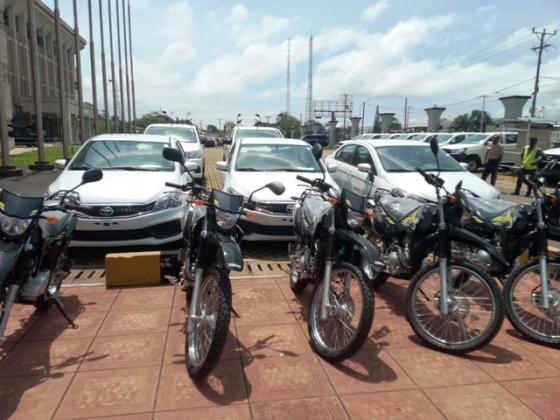Liberia: President Weah Commissions Work Permit Digitization Project

Few of the logistics that will be used to carry on the work permit project
— Vows to prosecute any employers who attempt to evade the payment of government taxes or who try to infringe upon the rights of workers
President George M. Weah has commissioned the work permit digitization project or center that is intended to allow the government through the Ministry of Labor to migrate from manual processing of documents to boost revenue generation.
The project was launched on September 13, at the Ellen Johnson-Sirleaf Ministerial Complex in Congo Town.
In commissioning the project yesterday, Weah vowed that his administration takes very seriously the protection of workers’ rights throughout Liberia and adequate employment for people who are qualified, competent, and available to work.
He noted that, as a responsible government, it is his duty to ensure that investors are treated fairly in their relationship with the government and with their employees.
Weah said his government will not hesitate to take stringent measures against any employer who attempts to evade the payment of government taxes or who tries to infringe upon the rights of workers.
The President described the initiative as a milestone project and the modernization of government operations for better efficiency and greater productivity.
According to him, this is the first time the country is digitizing the work permit and it will put Liberia on par with other African and Western countries.
He said the innovation will not only improve efficiency but will also increase revenue and provide new employment opportunities.
Weah added that it will enhance the capacity of the Ministry of Labor to protect and defend the rights of workers in the country.
He disclosed that the digitization of the work permit is a five-year project between the Government of Liberia, represented by the Ministry of Labor, and CETIS Graphics and Documentation Services Company of the Republic of Slovenia.
Weah further said that in addition to upgrading from a manual to a digital system, the project also provides for the up-front delivery of over five million US dollars' worth of ultra-modern electronic equipment, as well as the supply of 15 double-cabin 44 Toyota Pickups; two Jeeps; five sedans; and 35 Yamaha motorbikes.
"This contract also covers supplies of fuel, maintenance, and insurance of all equipment and vehicles, as well as salaries and daily allowances for the entire five-year duration of the project," he explained.
He also noted that the equipment will enable the Ministry of Labor to enforce the work permit regime of the government throughout the country.
The President further mentioned that the project will immensely enhance the capacity of the Ministry to inspect and ensure the safety and other conditions of workers in the workplace, including overall compliance by employers with Liberia’s labor laws, in both the formal and informal sectors of the economy.
Weah also noted that it will enable and empower the Ministry of Labor to work more efficiently and effectively simultaneously in all 15 counties of Liberia, in both the rainy and dry seasons.
Weah said policies must be adhered to without compromise while the government seeks to increase revenue from greater efficiency in the work permit regime.
He further said that they will not compromise the rights of Liberian citizens to priority employment opportunities.
Weah admonished all sectors to prioritize gender equity in employment, in both the public and private sectors, adding that his government will continue to seek to build the country’s economy by increasing employment opportunities for Liberians and prioritizing capacity-building in the workplace.
Earlier, the Minister of Labour, Cllr. Charles H. Gibson added that the project was birthed out of the need to first determine the status of the Liberian labor market.
He said one of those things that were done in early 2018 by his predecessor was to commission a study to determine the work permit income that could triple if it was moved from manual to digital.
According to him, the project provides essentially that the Ministry in the exercise of its statutory function will be able to more than double the country's revenue.
"This is a great day for workers because it is the first time in the history of this country, the Ministry of Labour has sufficient logistics to go into every corner of this country wherever there are workers and protect them."
With these logistics, the Minister said they will be able to supervise workers' compensation, safety in the workplace, statistics, and many other indicators that his Ministry is responsible for.
Gibson said he believed that in addition to increasing revenue, this logistics would allow the Ministry of Labour to be present and efficiently exercise its responsibility in all 15 counties at the same time.
For his part, Roman Znidaric, chief executive officer of CETIS, thanked the Liberian leader for the opportunity and trust to contribute to the MoL’s digitization process by providing a secure system for the new work permit.
He said the launch of the project could not have happened without the support of his experienced Liberian workers.
Znidaric, who is the contractor for the project, said the new work permit will provide a lot of benefits for Liberians, the government and foreign workers in terms of recruitment, among others.
